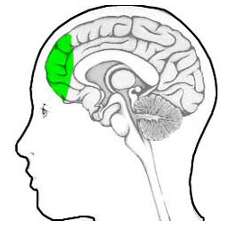Brain's prefrontal lobe is major player in Parkinson's Gait

A new study by Tel Aviv University researchers demonstrates that the prefrontal cortex, the part of the brain associated with cognitive functions, plays a major role in "Parkinson's Gait." It suggests a radically new understanding of the mechanism underlying gait difficulties in people with Parkinson's disease (PD) and may lead to new therapeutic approaches.
The study was led by Prof. Jeffery Hausdorff of TAU's Sackler School of Medicine and Dr. Anat Mirelman of the Department of Neurology at TAU's Sackler School of Medicine, co-directors of the Center for the Study of Movement, Cognition and Mobility at the Tel Aviv Medical Center; and conducted in large part by Dr. Inbal Maidan of Tel Aviv Medical Center. The work was recently published in the journals Parkinsonism and Related Disorders and Neurorehabilitation and Neural Repair.
More than motor deficits involved
The ability to walk safely and independently is central to functional independence and quality of life. That ability is impaired in people with PD, rendering the most basic and commonplace tasks nearly impossible.
Researchers had previously theorized that motor deficits associated with PD were the direct cause of impaired walking, the reduced ability to multitask while walking, and the dangerous falls associated with the disease.
However, when TAU researchers asked patients to walk and complete another task—e.g., a verbal fluency task such as naming fruits or simple serial subtractions—at the same time, also called "dual tasking," the gait pattern of patients with PD became worse. They walked slower and with less stability. This suggested that cognitive resources were being used as they walked.
"Work by our group has demonstrated that cognitive control deficits play an active role in the walking difficulties experienced by many people with Parkinson's," said Prof. Hausdorff.
New pictures of the problem
The team used functional near infrared spectroscopy (fNIRS) to show that cognitive resources are utilized by PD patients much more often than by healthy individuals. "The advantage of fNIRS is that we can measure brain activation during actual walking," said Dr. Mirelman. "These results are consistent with our study using MRI that found brain activity in Parkinson's patients was activated in the prefrontal cortex even during 'imagined walking.'
"The overactivation of the prefrontal cortex has a two-pronged effect in Parkinson's patients," Dr. Mirelman continued. "Because the prefrontal cortex is 'saturated,' it is unable to perform other tasks, impairing gait and creating cognitive deficits. The debilitation is two-fold."
Even when patients were lying flat in the MRI and merely imagining themselves walking, there was a "ceiling effect"—they were unable to recruit additional cognitive resources to tackle more difficult tasks involved with walking. "The increased activation during normal walking curtails the ability of Parkinson's patients to recruit further cognitive resources during other challenging tasks," said Prof. Hausdorff. "It may even exacerbate the high risk of falling in these patients."
The team is now conducting research to better understand the underlying mechanisms of the brain activation pattern and therapeutic approaches that may improve gait and reduce the risk of falls. The information is critical to the design of appropriate therapies such as virtual reality or non-invasive brain stimulation to improve neural efficiency.




















